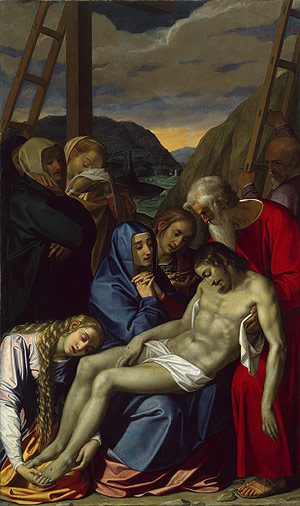Jesus’ death matters.
 I think very few Christians would disagree with that statement. For nearly all believers, the death of Jesus is one the primary points upon which their theology turns. How one understands the death of Jesus underscores how we view God, salvation, human destiny, love and Christ himself.
I think very few Christians would disagree with that statement. For nearly all believers, the death of Jesus is one the primary points upon which their theology turns. How one understands the death of Jesus underscores how we view God, salvation, human destiny, love and Christ himself.
This has certainly been true in my own life. In fact one of the primary reasons I became catholic is because of my own struggles answering the question, “why did Jesus die?”
However, in spite of the importance that many people put on the death of Jesus, for many Christians there has been little effort made into seeing how each of the four evangelists articulated Christ’s death differently in each of the four Gospels. Here are a few of the more significant variances:
In Matthew
– Pilot washes his hands of Jesus death and the crowd utters that Jesus’ blood should be on their hands and on the hands of their children.
– There is a mysterious dream that Pilate’s wife has, and she warns him to have nothing to do with Jesus
– Is the only account to have the dead come out of the tombs
– Jesus tasts the wine, but does not drink (Mark make no mention of tasting)
In Mark
– The wine offered to Jesus is mixed with myrrh (Matthew says it was mixed with gall, Luke and John don’t mention it)
– Is the only gospel to mention the names of Simon of Cyrene’s children (Alexander and Rufus)
– Is the only one where Jesus wears a purple cloak (Matthew has a crimson robe; Luke and John don’t mention it).
In Luke
– It is the only account where Jesus is not given a crown of thorns
– It is the only account where Jesus turns to the wailing women and tells them to weep for themselves
– Is the only passage where Jesus asks the father to forgive his executioners
– It is the rulers (not the scribes and chief priests) that mock Jesus (like in Matthew and Mark)
– Only in Luke does one of the robbers rebuke the other, and receive the promise of paradise
– Luke is the only Synoptic to omit the calling of “my God my God why have you forsaken me.”
– The centurion does not say Jesus was the son of God in this gospel, but instead says he is innocent.
– The multitudes beat their breasts and go home at the end in this gospel
– In this gospel the people watch, but don’t mock
In John
– Is the only account without a Barabbas narrative (though in Luke Barabbas is not named)
– Jesus is not helped by Simon of Cyrene
– Only in this gospel does Jesus talk to John and his mother, and give his mother into John’s care
– John does not even include the mockers while Jesus is on the cross
– Only in this gospel is the account of the pierced side told
– Only here is the narrative about the dispute between Pilate and the Chief Priests about Jesus being called “king of the Jews” given.
Not only are there these significant valences in the count of Jesus death, but there are also major differences in the accounts of Jesus’ betrayal, trial, burial and resurrection.
I find these discrepancies fascinating.
They are a powerful reminder that Jesus death has been seen in different ways, even within the scriptures. When we think of the story it is important that we don’t simply conflate all the stories together. The common composite of all the elements removes each element of the story from its original narrative context.
Although we will never know for certain what each evangelist was thinking, it is valuable to take the time to at listen to each of the four gospels on their own terms. This is also true of each of the four gospels in their entirety.
I believe that the way Jesus died is very important, but I also believe that it is important to remember the different ways he died. We have four lenses in our Bibles that each see Jesus’ death differently. When we fail to read each gospel on it’s own terms we simply create a fifth gospel of our own devising, and that can be quite dangerous,
MY CHALLENGE TO YOU
Sit down and read through each of the four gospels straight through. You can do it in multiple sittings, but try to get through a whole gospel in a day so that you get the full force of what each evangelist is trying to do. I have done this a few times myself and have found it to be an incredible experience, and a powerful way to get to know Jesus better through the scriptures.












